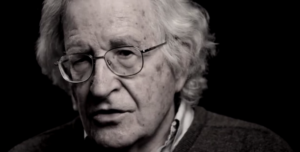Chomsky: US Government’s Nonresponse To Climate Crisis Has Historical Precedent
Coal baron Sen. Joe Manchin’s decision to block his own party’s clean energy program represents a huge setback in the fight against climate breakdown. It is even more dramatic considering that the U.S. is the only major economy in the world without a national climate policy. Of course, this sad state of affairs is not merely due to the likes of Manchin, but to the overall reactionary nature of the country’s political and economic landscape, as Noam Chomsky highlights in this exclusive interview for Truthout. Indeed, the dark forces at work in the contemporary United States are so powerful that they can stifle reform even when the future of the planet is at stake. But Chomsky argues that, as in the past, organized activism — engagement on the ground — can offer a way out even from the most exceedingly onerous conditions.
Noam Chomsky is Institute Professor Emeritus in the Department of Linguistics and Philosophy at MIT and Laureate Professor of Linguistics and Agnese Nelms Haury Chair in the Program in Environment and Social Justice at the University of Arizona. One of the worlds most cited scholars and a public intellectual regarded by millions of people as a national and international treasure, Chomsky has published more than 150 books in linguistics, political and social thought, political economy, media studies, U.S. foreign policy and world affairs. His latest books are The Secrets of Words (with Andrea Moro; MIT Press, 2022); The Withdrawal: Iraq, Libya, Afghanistan, and the Fragility of U.S. Power (with Vijay Prashad; The New Press, 2022); The Precipice: Neoliberalism, the Pandemic and the Urgent Need for Social Change (with C. J. Polychroniou; Haymarket Books, 2021).
C.J. Polychroniou: Noam, the United States, by all accounts, is doing a horrendous job at tackling the climate crisis. The Environmental Performance Index, developed by Yale and Columbia universities, ranks the U.S. 43rd among 180 nations on performance indicators covering climate change and environmental health, and ecosystem vitality. In fact, the U.S. is the only major economy without a national climate change policy, and Biden’s push for a clean energy program is all but dead, thanks to the determination of a single senator to protect his own portfolio investment over the future of the planet. On top of that, the Supreme Court has restricted the EPA’s authority to regulate greenhouse gas emissions. Clearly, then, the U.S. is not going to meet the target of achieving a 50-52 percent reduction from 2005 levels of greenhouse gas emissions in 2030. So, the question of paramount importance, in my own humble view, is this: Why is the U.S. so uniquely bad in confronting the climate crisis? There has got to be more to the story besides the influence of the fossil fuel industry, no?
Noam Chomsky: A lot more. Some indications about what is underway were given in the Supreme Court EPA decision. In the first place, there was no reason at all for the court to take up this case, which had to do with a 2015 proposal that was never implemented and is not in force. Presumably the court went out of its way to select the case as part of a long-term campaign to undermine the “administrative state” — that is, to undermine public capacity to restrict rapacious and in this case destructive private power. Or to put it more vividly, the capacity to restrict what Adam Smith called the “Vile Maxim”: “All for ourselves and nothing for other people,” the maxim that seems to guide “the masters of mankind … in every age of the world.”
In his age, the masters were the merchants and manufacturers of England; in ours, the private institutions that have become increasingly concentrated and obscenely wealthy during the neoliberal assault against the global population. The fossil fuel companies are among them, but others in the economic stratosphere will be beneficiaries of dismantling of the administrative state, a substantial intensification of the neoliberal class war. That’s what we are likely to see in the days ahead if the GOP, with its extreme subordination to private wealth and corporate power, extends its already substantial hold over the society.
It will be a short-term victory, however. There are good reasons why in past years the business world regularly called for regulation and other forms of state intervention to protect itself from the ravages of uncontrolled markets. The not-very-hidden principle underlying the Vile Maxim is that you, the “unpeople” of the world, are to be thrown into the market to find some way to survive. We, the masters, demand and receive ample protection from the nanny state.
The need for a “visible hand” is vastly more urgent now as the world hurtles towards destruction of organized human life, with the narrow window for survival being closed by the masters and their servants in the political system, basking in the applause of the most enthusiastic proponents of the Vile Maxim.
That leaves unanswered the deeper question: Why is the U.S. so “uniquely bad”? It hasn’t always been so. That’s important to remember. What is happening today is chillingly reminiscent of the 1930s, when the global state capitalist system was collapsing, with many “morbid symptoms.” Gramsci’s phrase, writing in Mussolini’s prison cells. Then the U.S. was a beacon of hope. While Europe was descending into fascist darkness, the U.S. was paving the way to social democracy under the impact of a revived and militant labor movement, with a sympathetic administration.
To be sure, much of the business world was strenuously opposed to these developments, biding its time for the opportunity to restore the business rule that has been unusually strong in the U.S., for historical reasons that we have discussed before. World War II put the conflicts in the background. When the war ended, the campaign to dismantle social democratic heresies was undertaken with vigor, but didn’t become triumphant until the neoliberal years, aided by neoliberal ideologues fresh from their service in Pinochet’s vicious dictatorship.
The fate of Biden’s energy program carries lessons as well. While nowhere near sufficient, the program was a long step beyond anything that preceded, as a result of major activist campaigns and the Sanders movement. The final blow was indeed delivered by coal baron Joe Manchin, who had been chipping away at the program steadily and finally declared that he’d accept nothing meaningful.
Manchin gave reasons: his concern over the deficit and inflation. Hardly credible. On the deficit, one way to address it is by reversing the radically regressive tax cuts of the neoliberal years, culminating in Trump’s one legislative achievement: the Donor Relief Act of 2017, as Joseph Stiglitz called it, a huge gift to the very rich and corporate sector, stabbing everyone else in the back. For the GOP, that is a red line that can’t be touched (along with funding the IRS to enable it catch wealthy tax cheats). Manchin goes along. No taxes on the rich. We have to preserve one of the great achievements of the neoliberal programs: For the first time in a century, billionaires pay taxes at a lower rate than workers.
What about inflation? There’s no credible argument that relates Biden’s climate program to the worldwide inflation. And if Manchin had concerns about this, he’d be calling for a windfall tax on corporate profits, cutting the bloated Pentagon budget, reversing the sharply regressive tax changes of the neoliberal years, and lots more.
Most Democrats are deeply dissatisfied with Biden’s overall approach to the climate crisis, according to a Pew Research Center report released just last week. This is especially so among young Americans, which leaves room for hoping that the course of the country can change in the near future. In any case, couldn’t the case be made that the Democrats’ sweeping plan to tackle the climate crisis was destined to fail if they tried to accomplish this through backroom deals rather than taking the cause directly to people and communities across the land?
Biden is unfairly blamed for this and other failures of his legislative program. The prime reason for the failure is the Mitch McConnell strategy: Block anything that might help the country, blame the harsh outcomes on the Democrats, retake power and intensify the harm for the population while enriching still more the constituency that counts. It works.
A popular-based party committed to the common good would have organized throughout the country, at the grassroots. That’s not the modern Democratic Party. Would it have made any difference? It’s hard to say. Could it, for example, have touched the Republican voting base, now in thrall to their denialist leadership and the divine Trump? Recall the recent polls that show that given a choice of 29 issues of concern for the coming election, moderate Republicans picked climate change as 28th, the rest 29th. That’s not easy to break through.
Not easy, but not necessarily impossible. It’s useful to recall the Yellow Vest slogan: You privileged people are worried about the end of the world, we’re worried about the end of the month. When people are concerned about how to survive in their precarious lives, there’s not much use telling them that scientists, who they distrust anyway, are predicting dire consequences down the road.
Certainly, that message should never be suppressed. People care about their grandchildren. But it should be accompanied by showing how you can get a better life and better jobs right now by shifting from destruction of the environment that sustains life to creating a better one. Right now. I can refer again to Bob Pollin’s outstanding work, both scrupulous analysis and direct engagement on the ground.
President Joe Biden said he will use his presidential powers to tackle the climate emergency. Every president since Washington has used executive powers in various ways, but it is unclear what Biden has in mind with regard to climate policy. For instance, he can issue an executive order power to stop approvals of all new fossil fuel infrastructure projects and ban federal fossil fuel leasing and drilling. Yet, he has been pushing all along for more oil production and approved more permits for oil and gas leasing on federal lands in 2021 than Trump did in the first year of his presidency. So, whom is he kidding when he talks about using the executive order power to tackle the climate emergency?
On approving more production and permits, there is an excuse: It was ordered by the right-wing judiciary. Whether the excuse is valid or a pretext, one can debate. The reaction to Russia’s invasion of Ukraine should move the minute hand of the Doomsday Clock even closer to midnight by reversing the limited efforts to move toward sustainable energy. Again, one can debate to what extent that choice was forced. The range of executive orders is limited, and the court might again resort to its “major questions” doctrine to accelerate the race to catastrophe, as it did in West Virginia v. EPA.
There is one conclusion that we can draw with fair confidence. Unless a mass popular movement develops that is powerful enough to break through the many barriers, humanity is facing a bitter fate.
The Pew Research Center report cited earlier reveals that an overwhelming majority of America favors planting a trillion trees to absorb carbon emissions and providing a tax credit to businesses for developing technology to capture and store carbon emissions. This confirms similar public views on climate policy captured by Pew surveys in past years, which seems to indicate that the vision of the Green New Deal has yet to make inroads into mainstream America. If this is the case, what has gone wrong? And what does it say about the prospect of implementing a Global Green New Deal, which was first launched by the United Nations Environmental Project in 2009?
The two favored policies have a common feature: no reduction in fossil fuel use — or reduction in profits for the fossil fuel conglomerate (the producers, the banks, the corporations otherwise involved in poisoning the atmosphere). The much harder message to get across is that we have to make serious moves right now to face the looming challenge, which is right in front of our eyes these scorching days. The longer we delay, the more forbidding the obstacles, the greater the cost and suffering. We can see what’s gone wrong. There’s no secret about how to steer the Titanic away from the icebergs. There’s still time.
I’ll reiterate something so obvious it shouldn’t even have to be articulated. This must be a common effort, everywhere. Crucially, that means a common effort of the great powers, hard as this may be to conceive at the moment. It means concern for the most miserable and tortured victims, who are not responsible for the crisis that has been created by the rich in the rich societies but will be punished more severely than anyone else. It means concern for the species that enrich the earth and are being destroyed by our foolishness and cruel disregard for what we are doing to our common home.
Copyright © Truthout. May not be reprinted without permission.
C.J. Polychroniou is a political scientist/political economist, author, and journalist who has taught and worked in numerous universities and research centers in Europe and the United States. Currently, his main research interests are in U.S. politics and the political economy of the United States, European economic integration, globalization, climate change and environmental economics, and the deconstruction of neoliberalism’s politico-economic project. He is a regular contributor to Truthout as well as a member of Truthout’s Public Intellectual Project. He has published scores of books and over 1,000 articles which have appeared in a variety of journals, magazines, newspapers and popular news websites. Many of his publications have been translated into a multitude of different languages, including Arabic, Chinese, Croatian, Dutch, French, German, Greek, Italian, Japanese, Portuguese, Russian, Spanish and Turkish. His latest books are Optimism Over Despair: Noam Chomsky On Capitalism, Empire, and Social Change (2017); Climate Crisis and the Global Green New Deal: The Political Economy of Saving the Planet (with Noam Chomsky and Robert Pollin as primary authors, 2020); The Precipice: Neoliberalism, the Pandemic, and the Urgent Need for Radical Change (an anthology of interviews with Noam Chomsky, 2021); and Economics and the Left: Interviews with Progressive Economists (2021).




